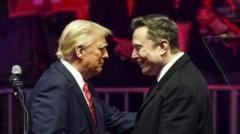Elon Musk, the world’s wealthiest individual, has taken on an unprecedented role within Donald Trump's administration as the head of the newly created Department of Government Efficiency (Doge). His presence has invoked a mix of intrigue and alarm in Washington. This week, Musk took to the platform he owns, X (formerly Twitter), playfully declaring that his “preferred title” was merely "Tech Support," a statement that belies the considerable power he has wielded in Trump's second term.
In the first two weeks since Trump's inauguration, Musk moved swiftly to reshape federal operations, including exerting control over the federal payment system, shutting down an agency, and providing civil servants with staff notices to either resign or face termination. His aggressive style—a trait reminiscent of his corporate maneuverings at Tesla and SpaceX—has created friction with traditional governmental institutions.
Initially perceived as a Democratic supporter, Musk’s pivot toward an alliance with Trump was gradual but significant. After initially urging Trump to step aside for Ron DeSantis, Musk became one of the president's most fervent supporters, pouring hundreds of millions into Republican campaigns and establishing himself as a key advisor. Musk's seating position at Trump's inauguration—directly behind the president—has underscored his rising influence.
Despite Musk's absence of a formal office in the West Wing, reports indicate that he has settled into federal offices nearby, moving his team into government spaces and gaining access to classified materials, thus deepening his entrenchment in federal matters. Known for his impetuous decision-making style, Musk's tactics have raised alarms among government workers, especially highlighted by reports of rash terminations at Tesla, with employees expressing frustration and concern over the changes he has been catalyzing.
One critical area of focus has been USAID, the agency responsible for international aid, which experienced a dramatic halt to operations under Musk’s directive. Characterizing the agency as a "criminal organization" on X, Musk's rhetoric has been accompanied by real-world consequences, including a stoppage of its functions and a paralysis of its operations overseas.
The abrupt overhaul has led to concerns regarding legality, as experts warn that Musk's efforts to dismantle or restructure USAID conflict with congressional stipulations that designate it as an independent entity. However, allies within the Republican party appear supportive of Musk's vision for streamlining governmental actions to prioritize national security.
Amid these developments, Musk’s unprecedented role raises questions regarding the use of private sector leverage in governmental affairs. Critics argue that entrusting a private citizen with extensive governmental power deviates from democratic norms, as Musk’s insistence on unilateral decision-making could bring instability to established institutions.
As his influence grows, the potential for a clash of wills between Musk and Trump emerges, particularly as Musk exhibits ambitions that may stretch beyond advisory roles to take full control over operations. With many voices within Silicon Valley echoing a sense of disbelief at these rapid upheavals, the outcome of Musk's integration into American governance remains to be seen.
Though Trump has acknowledged Musk's contributions as beneficial, he also reminds skeptics that all final decisions will stem from his authority— a statement that leaves many observers pondering the involvement of one of tech's most controversial figures in shaping government policy.




















